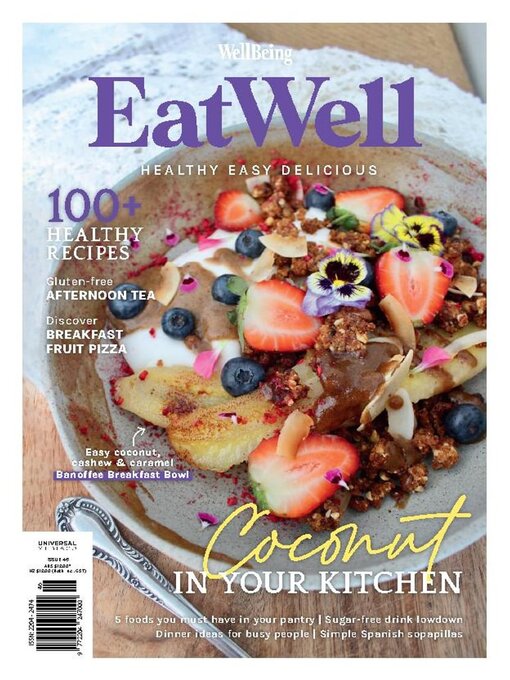A sexy Recipe Mag that has a healthy approach to good food. Taste every page as you flick through – delicious! Why bother? Because everything in here is good for you, easy, and yum. We know you are busy so we give you everything you need to eat well – recipes, shopping lists, quick ideas. You’re tapping in to a heap of wisdom from passionate chefs, bloggers and caring home cooks. You can share yours too – we’re a community. Life’s short…. outsource your food plan to people who love healthy good food. If you stopped buying recipe mags years ago because they’re full of things you can’t eat – then try Eat Well! Over 70 recipes per edition.
Mangosteen • Mangosteen (Garcinia mangostana) is a tropical fruit with a slightly sweet and sour flavour. It originated in Southeast Asia but today is grown in tropical regions around the world. Australian-grown mangosteens are in season from November to March, with the peak of the season around February. The purple outer rind of mangosteen is inedible but is easy to remove and reveals bright-white inner flesh. This juicy flesh is relatively low in calories but high in fibre and can be eaten raw or added to fruit salads or smoothies.
Skoudekharis • Skoudekharis is the national dish of the East African nation of Djibouti. It is made of rice, lamb and Ayurvedic spices, especially cardamom. Lamb can be substituted for chicken, beef or fish, although this dish is commonly served alongside grilled chicken and is invariably partnered with brightly dyed rice and a buttery sauce called "niter kibbeh”, made from clarified butter infused with herbs and spices. Frequently, skoudekharis is also served on top of laxoox (pronounced "lahooh”), a nutritious flatbread made from teff flour and sweetened water.
from the EDITOR
Eat Well
Our Chefs
Limonana • Limonana is the pavlova of the drink world and its country of origin is disputed. Some say this beverage originated in Turkey, while other sources attribute it to Syria. Whatever its origins, limonana is popular all around the Mediterranean and when you make it you will see why. The name is the giveaway, coming from the word “limon” (meaning lemon in both Arabic and Hebrew) and the Hebrew “nana” (meaning mint). The ingredients are simple: lemon, mint, water and a sweetener. To make limonana, just add your lemon, mint leaves and water to a blender and blend. Whatever you choose to sweeten can be added to the blending, but it may not dissolve, so it can be best to make a syrup that you add instead. Serve over ice and you have a delicious drink that will tantalise your tastebuds as it refreshes.
Cucumber (Cucumis sativus) • Cucumbers are delicious fresh but they also offer plenty more options in the kitchen.
5 PANTRY SAVIOURS • Whether you’re cooking a simple breakfast or something more exotic, here are five pantry food staples you should have on hand to cook plenty of delicious meals in the comfort of your own home.
Healthy HOMEMADE PIZZA • Pizza is a hugely social and often delicious food, but unfortunately it often comes laden with guilt for the calories you are consuming without nutrition. What if you could have your pizza and enjoy it because you know it is nutritious and healthy? Take the guilt out and insert some joy into your pizza eating with out healthy pizza recipes including: cauliflower vegetarian; seeded ham, cheese and avocado; zucchini and goat’s cheese; meat lover's with cauliflower crust; and a stunning breakfast fruit pizza.
Chutney • Chutney takes its name from the Hindi chatni, meaning “to lick”, or perhaps from chasni, meaning “sugar syrup”. Chutneys can be made from a variety of ingredients such as apple, pear, mango, lemon, tomato, coconut, sugar, citrus peel, garlic, ginger, mint, turmeric, cinnamon and chilli. In India chutneys are served with every meal, either as a relish for curries or a sauce for meats....

 Issue 60
Issue 60
 Issue 59
Issue 59
 Issue 58
Issue 58
 Issue 57
Issue 57
 Issue 56
Issue 56
 Issue 55
Issue 55
 Issue 54
Issue 54
 Issue 53
Issue 53
 Issue 52
Issue 52
 Issue 51
Issue 51
 Issue 50
Issue 50
 Issue 49
Issue 49
 Issue 48
Issue 48
 Issue 47
Issue 47
 Issue 46
Issue 46